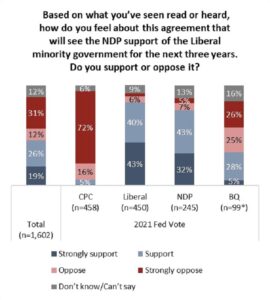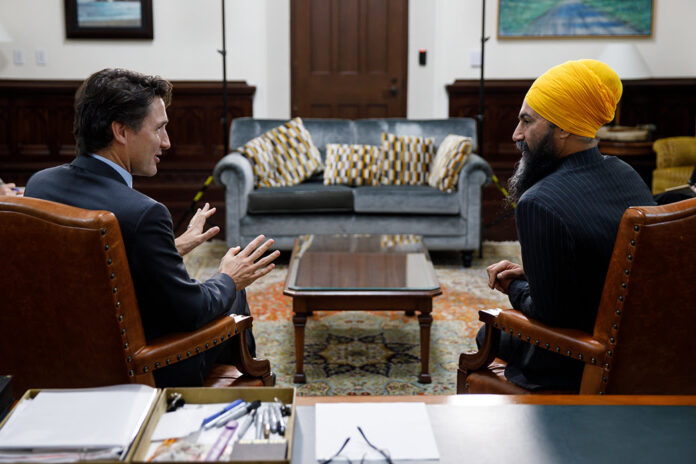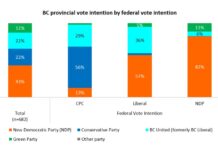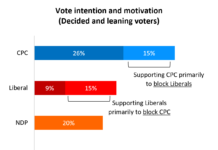THE NDP-Liberal confidence-and-supply agreement that would see major New Democratic policy planks adopted in exchange for security on confidence and money votes in Parliament may have united Canada’s left of centre political parties, but it has also left the country divided over support for the deal and perceived fairness.
New data from the non-profit Angus Reid Institute finds on one side overwhelming majorities of past Liberal and NDP voters either support or strongly support the agreement. On the other, a near-unanimous number of past CPC voters and half of past Bloc Québécois voters oppose it.
Overall, 45 per cent support the deal, 43 per cent are opposed. Almost three-quarters (72%) of past Conservative voters find themselves in that group strongly against co-operation between the NDP and Liberals.
The bipartisan arrangement is set to hold until 2025, much longer than a minority government typically lasts. Canadians are more likely to see Trudeau and Liberals’ side of the bargain as the favourable one, by a factor of three-to-one. Three-in-five (60%) say Trudeau got the better end of the deal; one-in-five (18%) believe it’s weighted to the NDP. Notably, just one-quarter (23%) of those who voted NDP in September say leader Jagmeet Singh came out on top.
Another winner of the deal according to many Canadians? The country’s social safety net. Half (48%) believe the NDP-Liberal agreement will be a good thing for government social assistance, nearly double those who say it will actually be bad (26%). Otherwise, Canadians are split on the potential effects of co-operation between the NDP and Liberals. Nearly as many say it will be good for the economy (38%), democracy (42%) and themselves (34%) as say the opposite (39%, 38%, 33% respectively).
The upcoming spring budget – expected in early April – presents a first significant hurdle for the NDP-Liberal pact. It potentially includes a “pay the piper” moment for Trudeau’s promises to North Atlantic Treaty Organization allies to increase defence spending in the wake of a now month-long Russian invasion of Ukraine.
Canadians in general are now more supportive of increased defence spending than they have been in the recent past. More than half (56%) believe more money should be allocated to the Department of National Defence. One-third would keep the defence budget stable and one-in-ten (12%) would decrease it.
Among that latter group are a significant proportion of those who voted for Trudeau’s new partner in policy – one-quarter (24%) of past NDP voters want to reduce defence spending, more than any other partisan group. As such, the budget could present a first real test of the NDP-Liberal commitment.

*Smaller sample size, interpret with caution
More Key Findings:
- Three-in-ten Canadians believe the agreement will go the distance. As many (32%) believe it will fall apart before the end of next year.
- Half of Canadians (48%) would call the deal fair because parties should work together for government. Two-in-five disagree and would call it unfair (38%) because it’s not what people voted for. Most (81%) past Conservative voters fall into the latter group.
- Three-quarters (76%) of those who voted for CPC in September believe that in the NDP-Liberal arrangement Trudeau got the better end of the deal and Singh got the short end of the stick.













